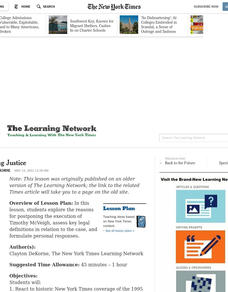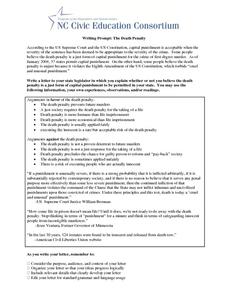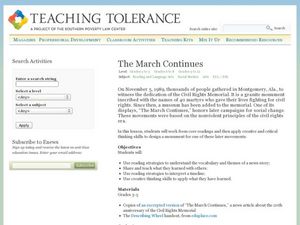Curated OER
Juvenile Justice - Decline Hearing
High schoolers analyze what a Decline Hearing is according to juvenile justice. They also study and evaluate the Kent Criteria.
BBC
Crime: Justice
Are the juvenile courts fair? Learners read a bit from the classic Oliver Twist to consider how young people are treated and represented when they've been accused of a crime. They read a case study from their books, discuss children's...
Curated OER
Stories of Freedom and Justice: Learning Resources
Pupils are introduce to the topic of nonviolence and civil rights by watching a video. In this stories of freedom lesson plan, students examine the Supreme Court's role in interpreting the U.S. Constitution. Pupils analyze how conflict...
Curated OER
Letter Writing: Social Action Project
Help your pupils sharpen their letter writing skills. They compose business letters that include greetings, headings, closings, and a professional tone for a philanthropic organization requesting information. Use this resource to...
Facing History and Ourselves
Hands Up, Don't Shoot!
Why is it so difficult to develop a clear understanding of the events surrounding the shooting of Michael Brown by a Ferguson, Missouri, police officer? To answer this question class members listen to a NPR discussion of the findings of...
American Documentary
The Benefits and Drawbacks of Plea Bargains
The outcome of 90 percent of criminal cases in the US is determined by plea bargains. Clips from the documentary Better This World create the backdrop for an investigation of the benefits and drawbacks of the plea bargaining process....
Curated OER
Justice For All?
Students study about President Bush's nomination of federal appeals court judge John G. Roberts to the Supreme Court. They compare coverage of the nomination in different sections and articles in The New York Times.
Curated OER
Checks and Balances in Supreme Court Nominations
Students discover the system of Checks and Balances related to recent events prompting action by one or more of the three branches of government. They study the process for selecting and confirming a Supreme Court justice. They examine...
Curated OER
Women Judges and Justice in Washington State
Students learn of the barriers women have faced in becoming lawyers and judges and identify strategies women use to become successful.
Curated OER
Justice at the Local Level: Is it Effective?
Students view a PowerPoint presentation on the court system. They are arranged into groups and evaluate the effectiveness of the criminal and civil courts in local Michigan communities.
Curated OER
Executing Justice
Students explore the reasons for postponing the execution of Timothy McVeigh, assess key legal definitions in relation to the case, and formulate personal responses.
Curated OER
Scooting Away from Justice?
Students examine President Bush's July 2007, decision to commute the 30-month sentence of former White House official, I. Lewis 'Scooter' Libby by reading a New York Times article. They scan editorial sources on various sides of the...
Curated OER
Can Justice Be Taylor-Made?
Students examine and discuss a quotation used as a slogan for Liberia's former president Charles G. Taylor. After reading an article, they consider the allegations against Taylor. In groups, they research a time period of his life and...
Curated OER
The Media and Social Justice in the United States
Students have group discussions that allow the teacher to assess the level of comprehension of the ideas of subjectivity and objectivity. Level of discussion at the end of the class provides some indication of comprehension as well....
Curated OER
GET UP, STAND UP: Fighting for Rights Around the World
Students explore basic human rights as they explore music by black artists. In this human rights lesson, students examine music as a cultural reflection of the justice issues. Students analyze Jamaican roots reggae of the 70s, American...
Teaching Tolerance
The War on Drugs—Mechanisms and Effects
The war on drugs doesn't have definite results. An interesting lesson examines the social, political, and economic effect of the war on drugs. Academics learn how the war on drugs has led to mass incarcerations and negatively affected...
Carolina K-12
Writing Prompt: The Death Penalty
Is the death penalty unjust because it violates the Eighth Amendment of the United States Constitution, "cruel and unusual punishment"? Or is it just a form of permissible capital punishment? After weighing arguments for and against the...
Prindle Institute for Ethics
My Dream of Martin Luther King
Conduct a book study of the story, My Dream of Martin Luther King by Faith Ringgold. Followng a read-aloud, scholars take part in philosophical discussions covering the topics of freedom, equality, race, and heroes.
Adult Fiction by Jewell Parker Rhodes
Ghost Boys: Educator Guide
The spirit of the Civil Rights Movement lives on in a more literal than figurative way in Ghost Boys. A focused lesson plan features Jewell Parker Rhodes' novel about ghosts of slain black teenagers, including the main character, Jerome,...
Curated OER
American Justice: The Texas Cheerleader Plot
Students watch a video about one woman who planned to commit murder because of a cheerleading scandal.
Curated OER
You and the Law -- Beating the Odds
Students examine the rate of institutional racism in the United States. Individually, they write in their journals about how they can make better choices and increase their self-esteem. Using historical documents, they identify the...
Curated OER
Day in the Life of a Homeless Person
Students examine a day from the point of view of a homeless person. They listen to and discuss two stories, identify ways to help homeless people, watch a Reading Rainbow video, and write an essay.
Curated OER
The March Continues
Students explore the Civil Rights Memorial. In this character development and U.S. History lesson, students employ reading comprehension strategies while reading a news article about the Civil Rights Memorial. Students work in groups to...
National Endowment for the Humanities
NAACP's Anti-Lynching Campaign in the 1930s
Students examine the anti-lynching campaign sponsored by the NAACP in the 1930's. In this social justice lesson, students study the history of the anti-lynching campaign and determine why it was not successful. Students conduct research...
Other popular searches
- Criminal Justice System
- Criminal Justice
- Social Justice
- And Social Justice
- Justice Lesson Plan
- Juvenile Justice System
- Environmental Justice
- Justice System
- Juvenile Justice
- The Criminal Justice System
- Supreme Court Justices
- Adult Justice System























